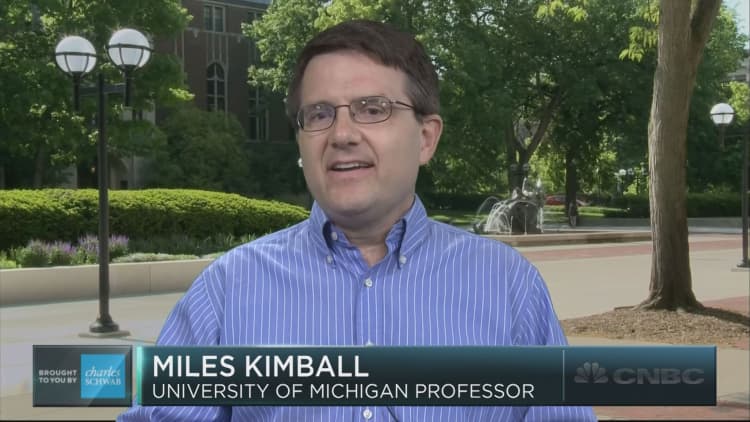
The Federal Reserve reminds economist Miles Kimball of an automobile missing one key feature.
"Think of the following analogy: If you had a car where everything else worked, but you couldn't put it in reverse, that would be a pain. You'd get by with that car, and you'd be able to do a lot of things with it, but it wouldn't be as convenient as a car that could go in reverse," Kimball, a professor of economics at the University of Michigan, said Friday on CNBC's "Trading Nation."
For Kimball, the Fed finds itself similarly constrained by its own policy tools. He believes that the central bank should feel free to raise rates at one meeting only to lower them at the next, or vice versa, as the economic data suggest.
Former Minneapolis Fed President Narayana Kocherlakota has argued the same, but to him, this suggestion seems mostly a conduit for the Fed to lower rates in the midst of a rate-raising cycle. In fact, he has made clear that he favored a rate cut in June.
Kimball, meanwhile, makes the point that if the Fed felt comfortable in lowering rates, it would make it easier for the central bank to hike.
"It's partly because they've set this rule for themselves implicitly that you can't reverse course very often that they're so afraid to raise rates," he said.
A more flexible Fed "could act more vigorously and if it sees inflation coming, raise interest rates faster, and if it sees the economy tanking, lower interest rates faster."
Not every economist is on board with Kimball's suggestion, however.
For Robert Murphy, associate professor of economics at Boston College, the potential benefits of a rate cut would be smaller than the communication issues such a move would cause.
"There's not a lot to be gained by moving it back down a quarter point unless some huge crisis happens," Murphy told CNBC in a Monday phone interview.
Meanwhile, Fed policymakers "want to be able to signal broadly where they're heading in the future, and a stop-and-go rate policy could cause markets to have more uncertainty about what the Fed's really up to. The reputational effect to them not being about to signal well where they're heading would be a problem."
For Kimball, however, the explanation for the Fed's implicit policy choice may be partly psychological.
"The fact that they're trying to look like they've never made a mistake causes them to underdo things," he posited.






